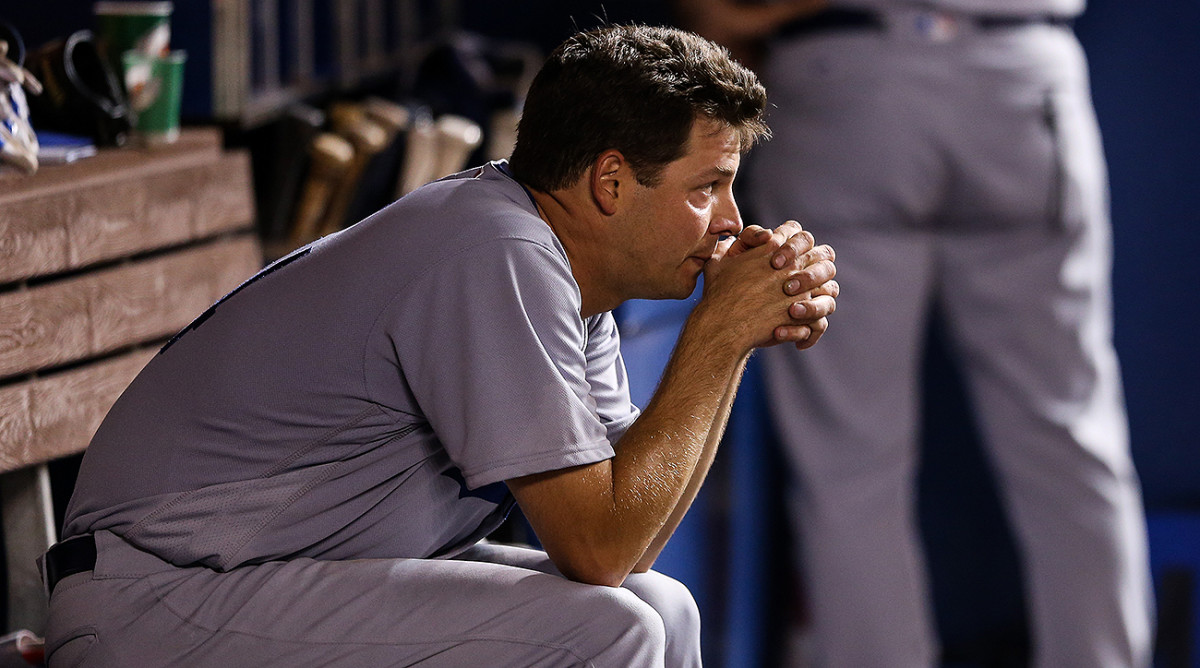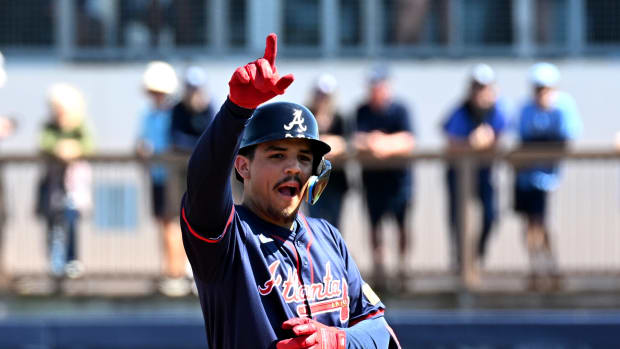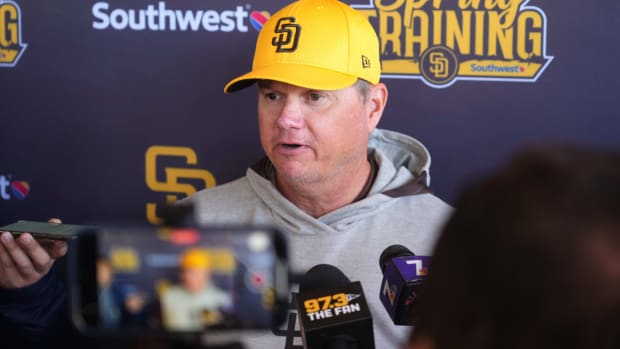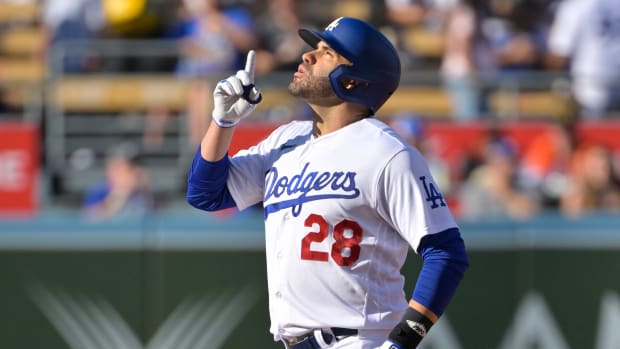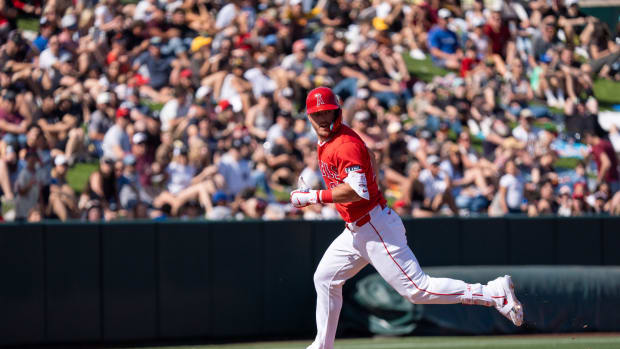Decision to pull Rich Hill during perfect game could pay dividends in October
On Sept. 2, 1996, Yankees righthander David Cone had a no-hitter going through seven innings against the A’s when manager Joe Torre went to talk to him in the dugout in Oakland. At the time, Cone had thrown 85 pitches but New York was in a battle for the division title and the team’s 33-year-old ace, a former Cy Young award winner pitching in the first year of a three-year $19.5 million contract, was making his first start in exactly four months, having missed the bulk of the season after a potentially life-threatening aneurysm was discovered in his pitching arm.
Torre removed Cone and the Yankees lost the no-hitter but won the game. Later that month they wrapped up the AL East, and in Game 3 of that year’s World Series, Cone gave a gutty six-inning performance to ignite his team’s comeback from a 2-games-to-0 deficit against the Braves that resulted in New York’s 23rd championship.
“If I would have left him in to throw 105 or 106 pitches and his shoulder would have been achy tomorrow or down the road, I never would have been able to live with myself,” Torre had said the day of the game against the A’s. “I would have always regretted it.”
Kershaw among key players in MLB's September postseason chases
On June 1, 2012, Mets lefthander Johan Santana had a no-hitter going through seven innings against the Cardinals when manager Terry Collins went to talk to him in the dugout at Citi Field. At the time, Santana had thrown 107 pitches, New York was 1 ½ games out of first place and the team’s 33-year-old ace, a two-time Cy Young Award winner pitching in the fifth year of a six-year, $137.5 million contract, was making his 11th start of the season after having missed the entire previous campaign because of shoulder surgery. Collins elected to keep Santana in the game. He finished the no-hitter, the first and still only one in Mets history, but needed 134 pitches to do so. He made just 10 more starts that year, went 0–5 with a 15.83 ERA in his last five outings and landed on the disabled list that August with another shoulder injury as the Mets stumbled to a 74–88 finish. Santana never pitched in the majors again.
“Basically, the worst-case scenario happened,” said Collins three years later. “To throw that amount of pitches with that much pressureand that much adrenaline going, it can beat you down. And it did.”
On Saturday night, Dodgers lefthander Rich Hill had a perfect game going through seven innings against the Marlins when manager Dave Roberts went to talk to him in the dugout at Marlins Park. At the time, Hill had thrown 89 pitches, but Los Angeles needed to win to maintain its four-game lead over the Giants in the NL West and the team’s 36-year-old reinforcement was making just his third start for the Dodgers since being acquired at the Aug. 1 trade deadline because of a blister problem. Roberts chose to take Hill out of the game. Los Angeles lost the no-hitter but won the game.
“I feel sick to my stomach,” Roberts said afterward. “Rich obviously had a perfect game and the opportunity of a lifetime. It [was] a great opportunity for him, his family and his teammates, but we’ve been dealing with his blister and that caused him to lose a lot of time this season.”
If the rest of the Dodgers’ season mirrors what happened to the 1996 Yankees, and Hill avoids the fate that befell Santana, then what happened Saturday in Miami will become little more than a historical footnote. If not, then the decision to end a pitcher’s chance at history—especially a journeyman who just last year had to go down to independent ball to resurrect his career—will become even more hotly debated than it was when it was made.
• Rich Hill's journey back to being a successful MLB starter full of curves
All we know for certain right now is that Roberts made the wrong decision for Rich Hill’s shot at perfection and robbed him of the chance to do something every pitcher dreams of. But he made the right decision for the team, the bosses who sign his—and Hill’s—checks and for the millions of Dodgers fans who have been waiting more than a quarter-century for their team to get back to, much less win, the World Series.
He also, ironically, might have made the right decision for Rich Hill.
Consider: Hill will be a free-agent after this season. Last year, one that he started with the Long Island Ducks of the independent Atlantic League, Hill made it back to the majors with the Red Sox and posted a 1.55 ERA in four starts, which was good enough to earn him a one-year, $6 million contract with the A’s. It was the first contract Hill had ever signed for more than $1 million a year in a major league career that dates back to 2005. He has still never had a contract that lasted longer than one year.
Arrieta, Lester or Hendricks: Who should Cubs pick as Game 1 starter?
Even despite missing the entire month of June with a groin injury and then five weeks in July and August with the blister problem that forced his removal on Saturday, Hill’s stellar season, highlighted by a 1.80 ERA in 17 starts, ensures he is in line for the biggest and longest contract of his life. It also will likely be his last chance to get one. Pitching a perfect game wasn’t, by itself, going to get him an extra year on his deal or a couple extra million dollars. But a recurrence of a blister problem that might have caused him to miss more time down the stretch and, potentially, in the postseason, might have been costly.
The Dodgers, too, can’t afford to take any chances with Hill’s health. Although his resume is nothing like that of an ace, he is being asked to do a good impersonation of one for the Dodgers down the stretch. Three-time Cy Young winner Clayton Kershaw just returned to the club on Friday after missing more than two months with a back injury. Los Angeles’s rotation has been in tatters all season, and Hyun-Jin Ryu, Alex Wood, Brandon McCarthy, Scott Kazmir and Brett Anderson are all on the disabled list. The team has been forced to rely on the likes of 19-year-old super prospect Julio Urias, 28-year-old Japanese import Kenta Maeda and rookie Ross Stripling, the latter of whom, ironically, was removed by Roberts from a no-hitter in his major league debut on April 8 because he had already thrown 100 pitches.
• Kershaw so-so in return, but Dodgers well-positioned with ace back
Hill is going to be relied upon down the stretch in a way he hasn’t since he helped the Cubs win the NL Central—in 2007. This weekend’s series with the Marlins has kick-started a stretch in which the Dodgers play on 17 consecutive days, and they have just one off-day remaining this season. Hill is on track to start on Sept. 15 and 20, which would mark the first time he’s made three starts over an 11-day stretch in the major leagues since 2009.
That’s assuming, of course, that Hill actually can make those starts. Roberts said after Saturday’s game that there was “heat” on the area of Hill’s left index finger that has been bothered by blisters recently, suggesting another one was forming on Saturday. It remains to be seen if Hill will be able to pitch pain-free and blister-free for the remainder of the season. If he can’t, we’ll certainly have a much easier time judging Roberts’s decision.
That is perhaps an ironic word, for nothing about Roberts’ decision was easy. The final verdict for it, though, won’t come during Hill’s next start, in Arizona, or the one after that, at home in Los Angeles. It will come in the fall, when the fate of the Dodgers is finally decided. But imagine their season concludes with a championship for the first time since 1988, and imagine that Rich Hill is an essential reason for it happening. Then take stock of the man and his journey and the reward that awaits him and it would be fair to say that there is only one word for an ending like that: perfect.






























